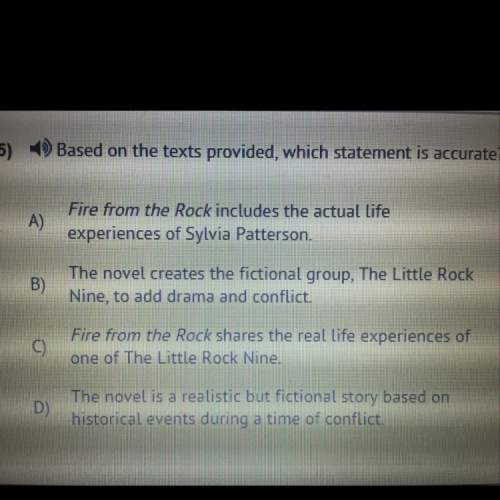
English, 21.09.2019 06:00 tytenaedwards6441
Read the excerpt from part 2 of the odyssey.
a prodigious man
slept in this cave alone, and took his flocks
to graze afield—remote from all companions,
knowing none but savage ways, a brute
so huge, [the cyclops] seemed no man at all of those
who eat good wheaten bread; but he seemed rather
a shaggy mountain reared in solitude.
what does the metaphor add to the passage? check all that apply.
. a description of the cyclops’ eating habits
. a comparison between the cyclops and a large land form
. an illustration of the cyclops’ cave
.a visual image of the cyclops’ size
.a comparison between the cyclops and odysseus

Answers: 2


Another question on English

English, 21.06.2019 18:30
It is true that prior to 1914 the united states often had been disturbed by events in other continents. we had even engaged in two wars with european nations and in a number of undeclared wars in the west indies, in the mediterranean and in the pacific for the maintenance of american rights and for the principles of peaceful commerce. but in no case had a serious threat been raised against our national safety or our continued independence. what is the theme of this excerpt? a. the responsibility for americans to avoid involvement in war.b. america’s history of international involvement.c. a new kind of threat to american security.d. america’s history as a peaceful nation.
Answers: 1

English, 22.06.2019 00:30
Ajourney with my father adapted from my reminiscences by sir rabindranath tagore probably in order to teach me to be careful, my father placed a little small change in my charge and required me to keep an account of it. he also entrusted me with the duty of winding his valuable gold watch for him. he overlooked the risk of damage in his desire to train me to a sense of responsibility. when we went out together for our morning walk, he would ask me to give alms to any beggars we came across. but i never could render him a proper account at the end of it. one day, my balance was larger than the account warranted. "i really must make you my cashier," observed my father. "money seems to have a way of growing in your hands! " that watch of his i wound up with such indefatigable1 zeal that it had very soon to be sent to the watchmaker's in calcutta. i am reminded of the time when, later in life, i was appointed to manage the estate and had to lay before my father, owing to his failing eyesight, a statement of accounts on the second or third of every month. i had first to read out the totals under each head, and if he had any doubts on any point, he would ask for the details. if i made any attempt to slur over or keep out of sight any item which i feared he would not like, it was sure to come out. so, these first few days of the month were very anxious ones for me. as i have said, my father had the habit of keeping everything clearly before his mind—whether figures of accounts, or ceremonial arrangements, or additions or alterations to property. he had never seen the new assembly hall built at bolpur, and yet, he was familiar with every detail of it from questioning those who came to see him after a visit to bolpur. he had an extraordinary memory, and when once he got hold of a fact, it never escaped him. my father asked me to copy the favourite verses, with their translation, from the book he liked reading every day. at home, i had been a boy of no account. here, when these important functions were entrusted to me, i felt the glory of the situation. 1. tireless 7 how does the narrator support the idea that his father keeps everything clearly before his mind? a. by giving the example of his father's response when his account did not tally with the money that he had in hand b. by mentioning that his father was interested in everything that happened around him c. by giving the example of his father knowing every detail of the new assembly hall at bolpur d. by mentioning that his father had marked his favorite verses from his favorite book
Answers: 3

English, 22.06.2019 04:00
Tori is writing a literary analysis of the novel little women. read the following claim statement she wrote about the story. in little women, louisa may alcott uses figurative language to readers understand the feelings and experiences of the central characters. which quote from the story can tori use as evidence to support her claim? a. “she knew it very well, for it was that beautiful old story of the best life ever lived, and jo felt that it was a true guidebook for any pilgrim going on a long journey.” b. “‘and so nice of annie moffat not to forget her promise. a whole fortnight of fun will be regularly splendid,’ replied jo, looking like a windmill as she folded skirts with her long arms.” c. “‘rather a pleasant year on the whole! ’ said meg, smiling at the fire, and congratulating herself on having treated mr. brooke with dignity.” d. “‘what are you thinking of, beth? ’ asked jo, when amy had her father and told about her ring.”
Answers: 1

English, 22.06.2019 09:30
What is the main problem that kyle faces at beginning of the story
Answers: 3
You know the right answer?
Read the excerpt from part 2 of the odyssey.
a prodigious man
slept in this cave alone,...
a prodigious man
slept in this cave alone,...
Questions

Biology, 24.01.2021 06:40

Mathematics, 24.01.2021 06:40

Computers and Technology, 24.01.2021 06:40


English, 24.01.2021 06:40

History, 24.01.2021 06:40




Mathematics, 24.01.2021 06:40




Mathematics, 24.01.2021 06:50



Biology, 24.01.2021 06:50


Social Studies, 24.01.2021 06:50




